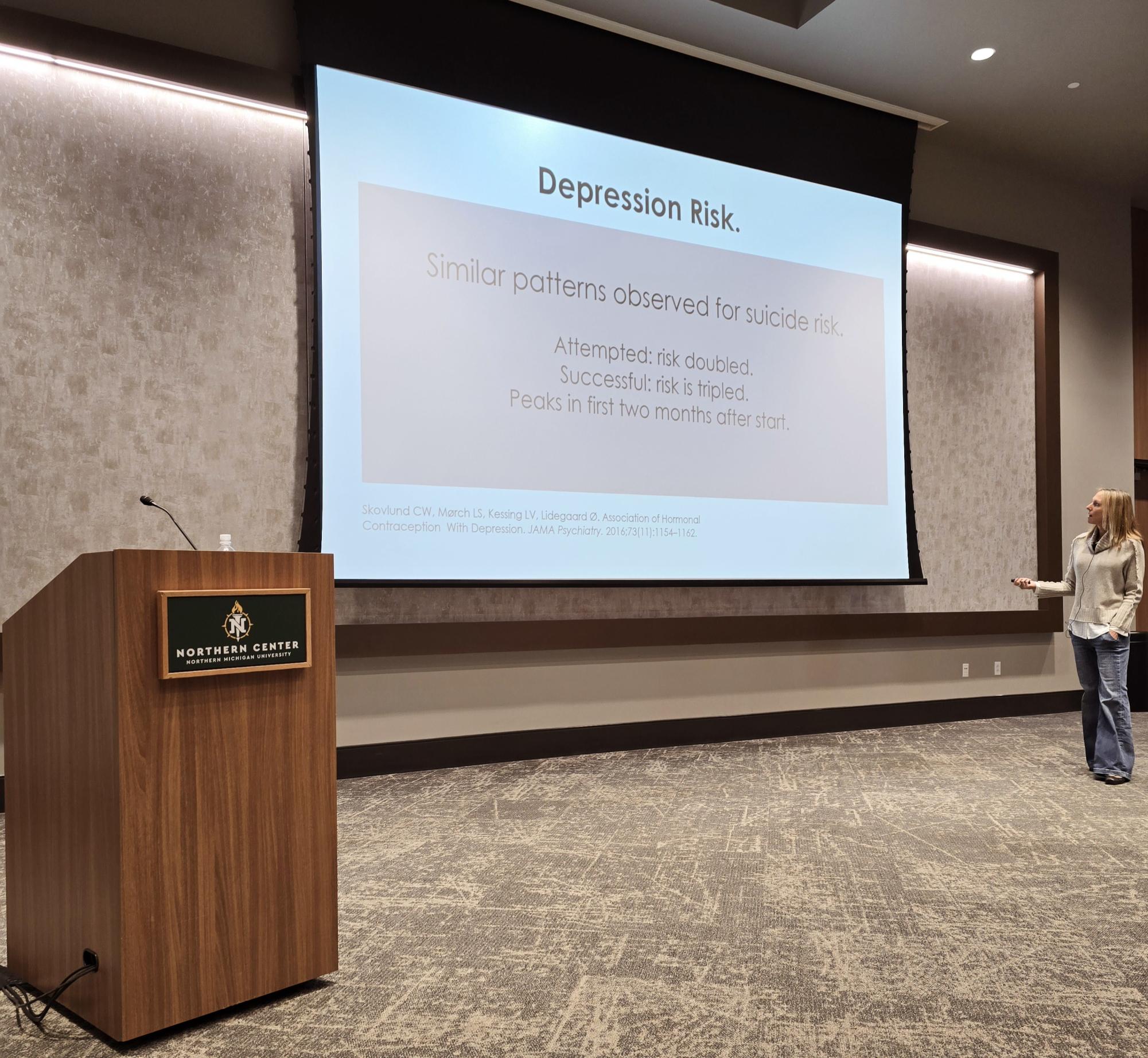The Student organization Feminism for All recently collaborated with the NMU WellBeing Department to bring Psychologist Sarah Hill to the Northern Center for a seminar based on her book, “This Is Your Brain on Birth Control.”
The lecture, which took place on Thursday, Sept. 26, focused on the cascading effects of hormonal birth control on women’s minds and bodies. Members of both groups hosting the event were pleased to see the ballroom filled with students and faculty before the seminar began, and the audience nearly ran out of seating.
This event was highly anticipated, as its originally scheduled date during the Winter 2024 semester was canceled when NMU experienced a long stretch of snow days.
Many audience members took notes as Hill spoke about her work and the biological reasoning behind why there is such a range of effects of hormonal medications on the brain and female body.
Hill is an award-winning evolutionary psychologist who specializes in the effects of birth control on the body and brain. She has spoken on multiple national talk shows, campuses and podcasts to open people’s eyes to the complex nature of hormone-based birth control.
The drugs many young people use to prevent birth, lighten menstrual cycles and change their hormone balance influence the way they behave and conduct relationships with others. The growing brain alters a person’s eating behavior, sleep, emotions, learning comprehension and every organ in the body.
Psychology and neurology have a history of ignoring hormonal birth control and the effects it has on women’s brains.
Hill became impassioned by the ignorance surrounding this field of research when she attended a seminar that excluded women from the grouping because their hormonal receptors were non-functional compared to those who were not on hormone birth control. She decided then and there that women should be informed of this when they choose to go on birth control.
Sex hormones in the brain control a great deal of the human body, not just the sexual and reproductive organs. For females, the menstrual cycle is closely monitored in the brain and certain increases and decreases in hormones will cause a range of responses from the body. These hormones can range in reactions from a greater need for sleep, to appetite changes, behavioral changes and muscle contractions.
Hill comprehensively covered the menstrual cycle and its effects, explaining both the biological implications of the menstrual cycle and its psychological impacts.
Many doctors have no interest in the reactions that hormonal changes cause in someone’s mentality. These effects will also trickle down into physical alterations for a person. In some cases, doctors will even go so far as to prescribe birth control for non-reproductive reasons in teenagers.
Hill explained that doctors will often say there are little to no risks for adolescents to take hormonal birth control, but she has found something different.
“I don’t think that that’s what we’ll find at all,” she said. “There is some evidence now that suggests that using hormonal birth control during adolescence may be something that puts girls on a path to be at a heightened risk of developing major depressive disorder across their lifetime, even after they go off of it.”
Many patients will ask their doctors about the possibility of changes in weight caused by birth control. Doctors will often dismiss these concerns because they believe research articles covering this topic prove, on average, that those on birth control do not gain or lose weight.
According to Hill, research shows that those who started hormonal birth control while at a lower weight usually gained weight, while those who started at a higher weight tended to lose weight. When the focus group is averaged out, these trends cancel each other out. Hill has just published a research paper titled, “Moving Beyond the Mean,” which references other studies containing these documented effects.
Within the first six months, 50% of women on hormonal birth control quit taking it because of the unpleasant side effects. The entire population of Denmark has been studied to determine the risk of developing depression and anxiety from being on birth control. The women of Denmark had an increase in risk by up to 20% when they started the progesterone-only pills and up to a 90% increase if they used non-oral products when compared to women who were not using hormonal birth control. Young women have a 20% increase in risk from both pills and non-oral birth control.
A silence fell over the audience when Hill clicked to a slide detailing increases in suicide and suicide attempts caused by birth control. The risk of suicide attempts is doubled, and the success of suicide is tripled, peaking in the first two months of starting hormonal birth control. Audience members had a sudden understanding that this medication does not just cause irritation or weight changes, it can end lives.
“There [are] probably 100 things that are like this, for example, with depression,” Hill said. “We know that being on the pill can increase your risk of depression, whether it increases or decreases your risk of depression probably also depends on … what was your mental health like when you started? …. There [are] a lot of these person-based questions that also need to be answered in order to try to better drill down on who’s going to respond in what way to what name.”
To make patients aware of the risks and negative side effects of birth control helps them feel more understood and connected with themselves and their health care provider. It is important to educate doctors on the reactions these medications can cause both mentally and physically.
This connection and understanding could save more women from becoming a statistic in another study. When women stop being treated just as patients and start being treated as humans with feelings and different bodies, then there may be better developments in birth control and similar prescriptions.







